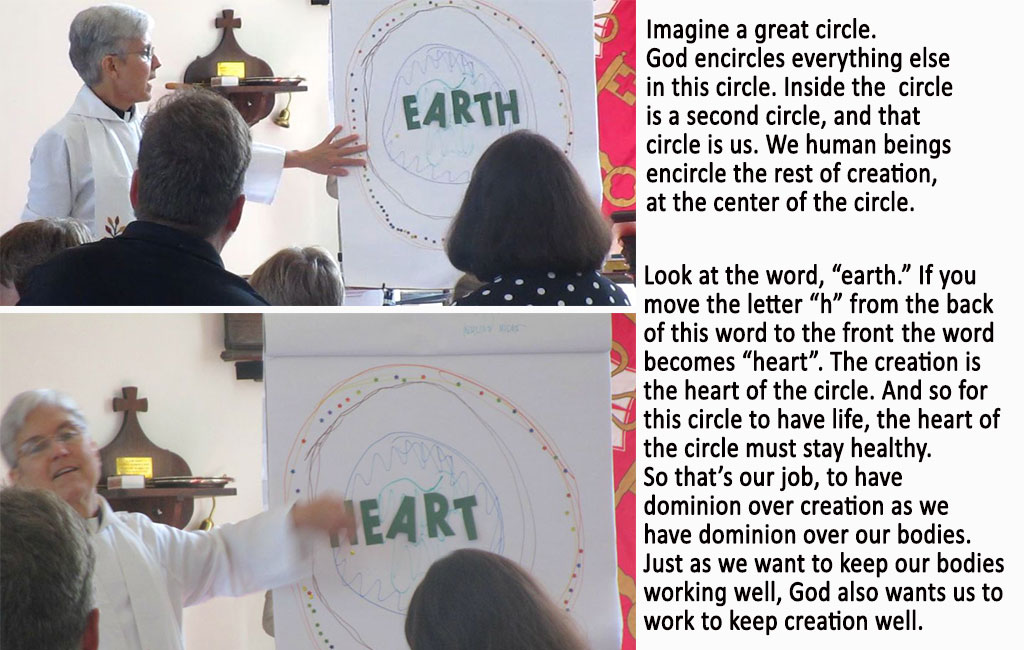The guide to Native Plants for Central Rappahannock Virginia highlights the plants native to the Central Rappahannock area – Caroline, King George, Spotsylvania, and Stafford counties and the City of Fredericksburg. In North America, plant species are generally described as native if they occurred here prior to European settlement. This distinction is made because of the large-scale changes that have occurred since the arrival of the European settlers. These plants form the primary structure of the living landscape and provide food and shelter for native animal species, including migratory birds and pollinators. (Switch to presentation mode  on the toolbar for larger text.)
on the toolbar for larger text.)
Season of Creation
Introducing – The Obedient Native Plant
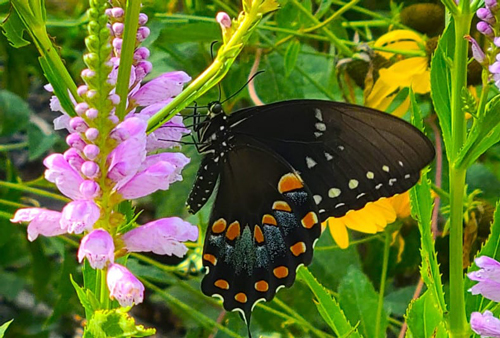
The Obedient Plant is a native flower of North America that grows 4′ tall in full sun with moist to medium soil.
Obedient plant gets it’s common name from the fact that one can bend a flower to the side, and it will stay put.
It attracts bees, butterflies, and hummingbirds. It blooms tall spikes of pink tubular flowers for six weeks in late Summer.
The native range of Obedient Plant is North America, East of the Rocky Mountains, with the exceptions of Florida, Connecticut and Massachusetts. So it should grow in variety of climates.
Here is a video describing how the Obedient Plant is obedient.
Assessing Climate 2023 – Seven Victories
From Earthday.org
#1: The Ozone Layer is on Track to Heal by 2040.
The ozone layer is recovering, with projections indicating a return to 1980 values by 2066 over Antarctica, 2045 over the Arctic, and globally by 2040 if current policies continue.#2-The EPA Crackdowns on 5 Toxic Chemicals Commonly Used in Plastics.
The EPA has prioritized risk evaluations for five chemicals used in plastics, signaling a strong effort to address plastic-related issues.#3: 26 Species at Risk of Extinction Have Recovered in Australia. Australia, often recognized for its high mammal extinction rates, witnesses a glimmer of hope as 26 species have recovered enough to no longer be classified as threatened under the Environment Protection and Biodiversity Conservation (EPBC) Act.
#4: Scientists Discover Fungus Capable of Breaking Down Plastics. Australian scientists found a breakthrough method using backyard molds, Aspergillus Terreus and Engyodontium album, to efficiently break down persistent plastics, potentially enhancing plastic recycling rates.
#5: Youth Activists Win Historic Victory Against the State of Montana. In a landmark decision, a Montana state judge ruled the state’s support of fossil fuels violates citizens’ constitutional right to a clean and healthful environment, offering a legal precedent for climate activists. T
#6: Pepsi Cola Gets Sued for Their Part in the Plastics Crisis. In a positive move towards environmental responsibility, New York state’s Attorney General, Letitia James, has filed a lawsuit against PepsiCo and its Frito-Lay subsidiaries, holding them partially accountable for plastic litter affecting Buffalo’s drinking water. By taking legal action, the state emphasizes the right to clean water and aims to address plastic pollution, signaling a commitment to holding major corporations responsible for environmental impacts and pushing for cleaner practices.
#7: There Were More Investments in Solar Power Than Oil.The International Energy Agency (IEA) reports a significant shift in energy investment patterns, with solar power investments surpassing spending on upstream oil for the first time in human recorded history. More than $1 billion per day was invested in solar power in 2023, exceeding the total spending for new upstream oil projects.
The tipping points of climate change — and where we stand
Johan Rockström at TEDCountdown@BloombergGreenFestival July 2024
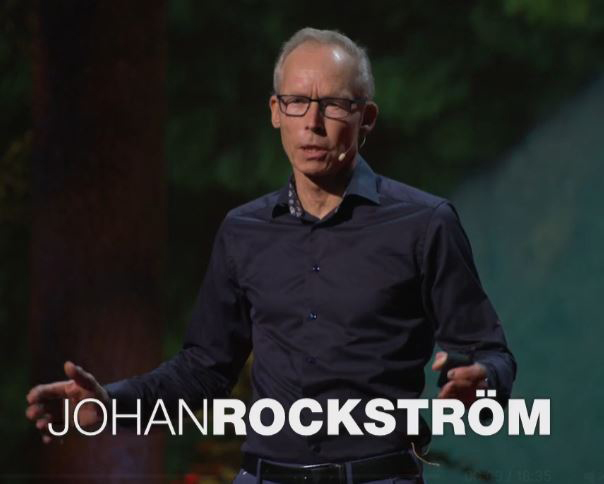
Key Points
1 The planet is changing faster than we have expected. We are, despite years of raising the alarm, now seeing that the planet is actually in a situation where we underestimate the risks. Abrupt changes are occurring in a way that is way beyond the realistic expectations in science.
Assessing Climate – What’s NOT Working?
From canarymedia.com
1. The United States is not currently on track to meet its goal of cutting emissions in half by 2030.
2. Over the past year, according to the European Union’s Copernicus Climate Change Service, global temperatures averaged 1.6 degrees Celsius (2.9 degrees Fahrenheit) above preindustrial levels.
Under the landmark 2015 Paris agreement, the world’s leaders pledged to hold Earth’s temperature rise “to well below” 2 degrees C (3.6 degrees F) above pre-industrial levels and pursue efforts “to limit the temperature increase” to 1.5 degrees C above pre-industrial levels, to avert some of the worst effects of global warming. The fact that the planet surpassed 1.5 degrees C for one year does not amount to a permanent shift, but it comes as scientists are warning that it is likely to happen again — within a few years.
A separate study published by a group of 57 scientists on Wednesday found that human activities were responsible for 92 percent of the warming observed in 2023, the planet’s hottest calendar year on record. It said the rate of warming in the past decade is “unprecedented in the instrumental record.”
3. Resource constraints. There may not be enough resources to fight climate change, and it can be difficult to allocate them efficiently. For example, funding for climate action, technology development, and climate adaptation in vulnerable regions may be insufficient.
4. Decarbonizing steel, cement and chemicals are still a challenge. They’re also among the largest global sources of carbon emissions — manufacturing them releases more CO2 into the atmosphere each year than all of the emissions generated by the United States.
These materials are so emissions-intensive not just because of how they’re made, but also because of how much of them the world uses
Summing up end of 2023 progress on Climate Change
From canarymedia.com
1. The U.S. climate law is fueling a factory frenzy.
The Inflation Reduction Act, signed into law in August 2022, aimed to bring a clean energy manufacturing boom to the U.S. through generous subsidies. So far, the plan is working: In the law’s first year, more than 100 new clean energy manufacturing facilities or factory expansions were announced, adding up to nearly $80 billion in new investment from private companies
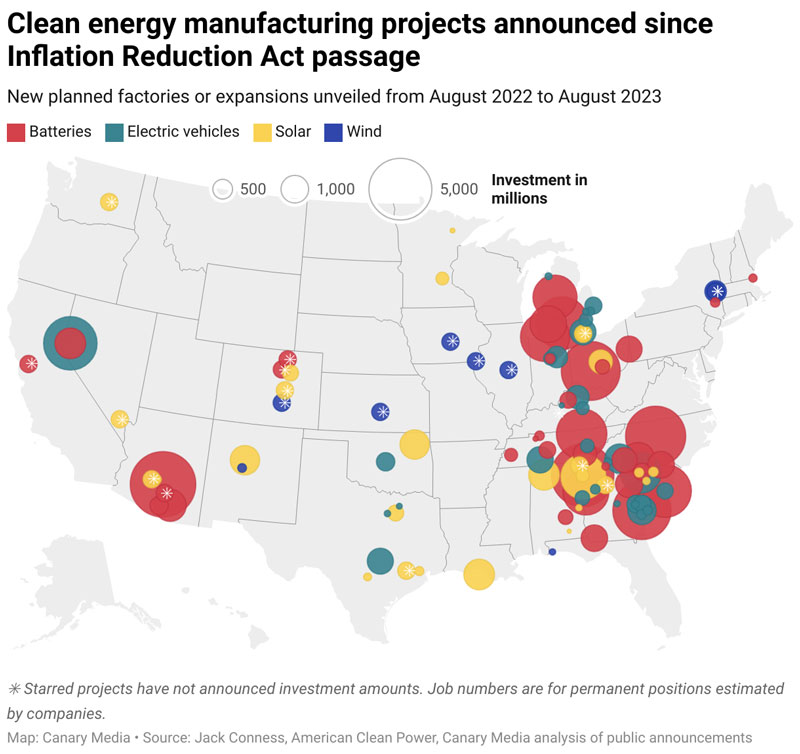
2. Renewables are on track to keep getting cheaper and cheaper
While fossil fuels have not gotten cheaper with time, renewable energy costs have plummeted over the past few decades. That’s made them more cost-effective than fossil fuels in many cases — and also more attractive to new investments. These cost declines are not expected to stop anytime soon. In fact, by 2030, technology improvements could slash the price of wind energy by a quarter and of solar by half.
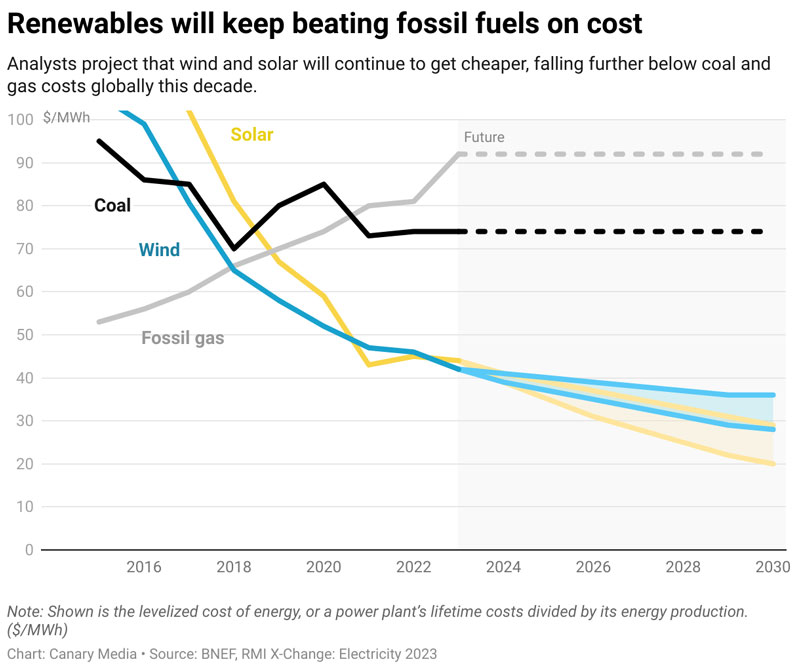
Though they still make up just 20 percent of overall power generation, solar, batteries and wind account for the most new power flowing to the U.S. grid — and it’s not even close. In 2023, clean energy will have accounted for the vast majority of all new power capacity added to the U.S. grid, while fossil-fueled plants will make up just 16 percent of new capacity.
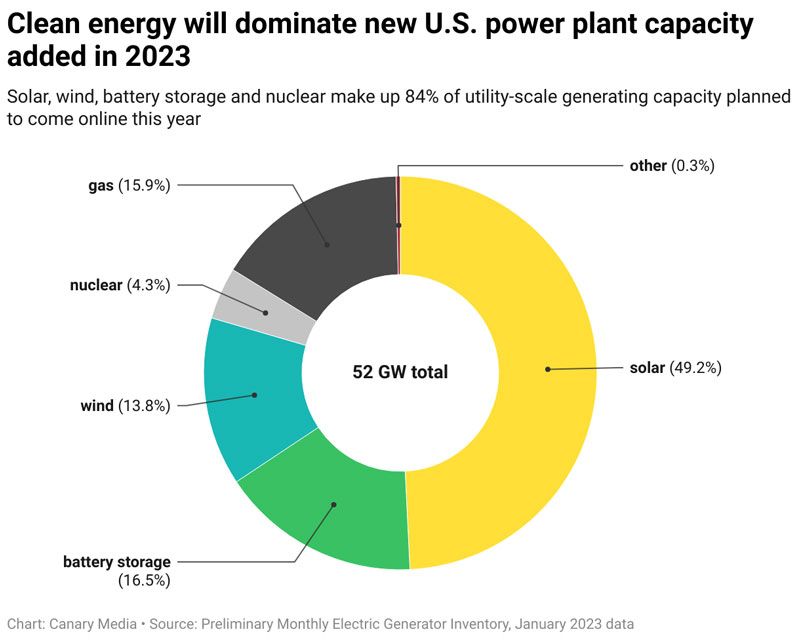
All-electric vehicles (also known as battery electric vehicles or BEVs) are powered by an onboard battery that stores electrical energy, according to the U.S. Department of Energy’s Alternative Fuels Data Center. Unlike conventional gas-powered or hybrid vehicles, EVs rely solely on electricity for propulsion. The Environmental Protection Agency (EPA) classifies EVs as zero-emissions vehicles due to the lack of exhaust or tailpipe emissions expelled.
Despite recent gloomy headlines, the U.S. electric-vehicle market has soared. According to marketwatch “Electric car sales have taken off in the U.S. since 2020. About 1.6 million EVs were sold in the U.S. in 2023 — a 60% increase from the 1 million sold nationwide in 2022.
Season of Creation – Water
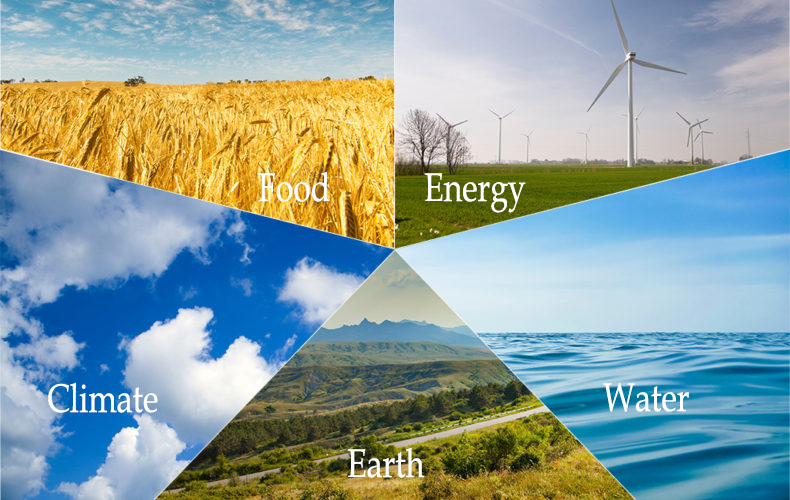
We have taken the five Sundays readings in the Season of Creation and highlighted a specific environmental area which we will cover weekly. (This week, water ) How is this area affecting us ? What can we do at St. Peter’s and individually to improve our use of them ? We have added related scriptures.
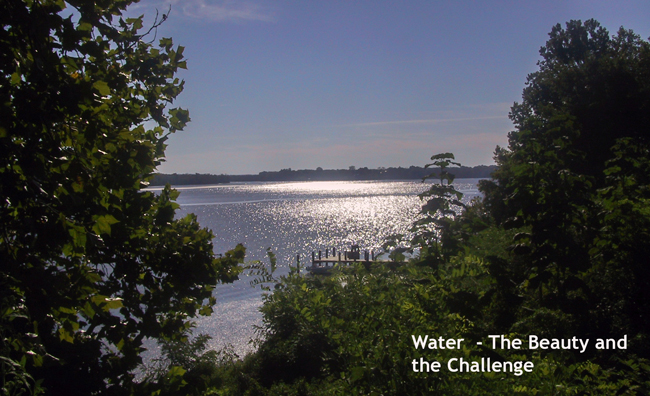
Focus on water in the Bible
1. Creation – Water is a primal force of creation . The Old Testament create story describes the earth as nothing but darkness but with the Spirit of God “hovering over the waters.”
2. Cleansing -The story of Noah shows God cleansing the earth with a great flood. Water sometimes symbolizes the spiritual cleansing that comes with the acceptance of God’s offer of salvation ( Ezek 36:25 ; Eph 5:26 ; Heb 10:22 ). In fact, in Ephesians 5:26, the “water” that does the cleansing of the bride, the church, is directly tied in with God’s Word, of which it is a symbol. The story of Noah shows God cleansing the earth with a great flood. In John 4:10-15, part of Jesus’ discourse with the Samaritan woman at the well, he speaks metaphorically of his salvation as “living water” and as “a spring of water welling up to eternal life.”

This painting represents Jesus as the truth and was painted by Troy Mulvien Mardigan, an indigenous Australian. From the artist: “The river represents Jesus as the living water. It is flowing from the foot of the cross towards new life. The flowers represent new life. He is the water of the dry land and the green land. On the top of the cross is the omega symbol – He is the beginning and the end.”
3. Rebirth – Water is very present in Baptism. Baptism means immersion or bath in Greek. The immersion cleanses the person of sin and provides rebirth into Christian life. In both the Old and New Testaments, the word “water” is used for salvation and eternal life, which God offers humankind through faith in his Son ( Isa 12:3 ; 55:1 ; Rev 21:6 ; Revelation 22:1 Revelation 22:2 Revelation 22:17 ).
Nicodemus understood Jesus that one must have two births to enter the Kingdom of God – one’s natural birth in which water plays a major role and the birth by the Spirit to be the supernatural birth of being “born again” or regenerated.
4. Troublesome times – The word “water” is used in a variety of metaphorical ways in Scripture. It is used to symbolize the troublesome times in life that can and do come to human beings, especially God’s children ( Psalm 32:6 ; Psalms 69:1 Psalms 69:2 Psalms 69:14 Psalms 69:15 ; Isa 43:2 ; Lam 3:54 ). In some contexts water stands for enemies who can attack and need to be overcome ( 2 Sam 22:17-18 ; Psalm 18:16-17 ; 124:4-5 ; 144:7 ; Isa 8:7 ; Jer 47:2 ).
5. Water a symbol of the Holy Spirit – In a very important passage, Jesus identifies the “streams of living water” that flow from within those who believe in him with the Holy Spirit ( John 7:37-39 ). The reception of the Holy Spirit is clearly the special reception that was going to come after Jesus had been glorified at the Father’s right hand and happened on the Day of Pentecost as described in Acts 2. Two times in Jeremiah Yahweh is metaphorically identified as “the spring of living water” ( Jer 2:13 ; 17:13 ). In both instances Israel is rebuked for having forsaken the Lord for other cisterns that could in no way satisfy their “thirst.”
6. In other passages of Scripture, the following are said metaphorically to be “water”: God’s help ( Isa 8:6 : “the gently flowing waters of Shiloah” ); God’s judgment ( Isa 28:17 : “water will overflow your hiding place” ); man’s words ( Prov 18:4 : “The words of man’s mouth are deep waters” ); man’s purposes ( Prov 20:5 : “The purposes of a man’s heart are deep waters” ); an adulterous woman ( Prov 9:17 : “Stolen water is sweet” ); and a person’s posterity ( Isa 48:1 : “Listen to this, O house of Jacob, who are called by the name of Israel and have come forth out of the line [waters] of Judah” ).
What is the “Season of Creation”?

The Season of Creation is an optional season for the church year. For the most part, the seasons of the church year follow the life of Jesus: Advent, Christmas, Epiphany, Lent, and Easter. The remainder of the church year encompasses Pentecost season (or Ordinary Time), which celebrates life in the Holy Spirit.
For centuries, our theology our theology has focused on relationship with God and our human relationships with one another. The Season of Creation focuses God’s relationship with all creation and with our relationship with creation (and with God through creation). It highlights our role in understanding and addressing address the ecological problems we face today as a part of God’s creation.
“Fun fact: planet Earth is 4.5 billion years old. Mankind? About 140,000 years old. Let me put that in perspective: If you condense the Earth’s lifespan into 24 hours, that’s one full day, then we have been here on this planet for… …drumroll please… …three seconds. Three seconds, and look what we’ve done….”
Prince Ea’s annotation for the video.
The Season of Creation, 2024
Sept 1 – Oct 4, 2024

For Five Sundays in September we will be in this optional lectionary within Pentecost. The end of the season, Oct. 4, is the Feast of St. Francis.
The 2024 Season of Creation’s symbol is “the first fruits of hope,” which is inspired by Romans 8:19-25. The theme for 2024 is “To Hope and Act With Creation”, and the symbol represents the idea that people can work together with creation to bring about hope. The hope is that creation can be freed from decay and brought into the glory of God’s children. Hope is also seen as a tool that can help people overcome decay and realize freedom.
Sept 1 was proclaimed as a day of prayer for creation (World Day of Prayer for Creation, or Creation Day) by Ecumenical Patriarch Dimitrios I for the Orthodox in 1989, and was embraced by the other major Christian European churches in 2001 and by Pope Francis for the Roman Catholic Church in 2015.
The event is celebrated in many faith traditions and has a centralized website. This year, the theme for the season is “To hope and act with Creation”. Amid the triple planetary crisis of climate change, biodiversity loss, and pollution, many are beginning to despair and suffer from eco-anxiety. As brothers and sisters in Christ, we are on a pilgrimage to better care of creation. As people of faith we are called to lift the hope inspired by our faith, the hope of the resurrection. This is not a hope without action but one embodied in concrete actions of prayer and preaching, service and solidarity.
In walking together, we follow the role of Jesus, who walked with friends on the roads around Jerusalem. As he traveled the byways of his community, Jesus invited us to encounter God through God’s presence in creation. Whether by considering “the lilies of the field” or the “grain of wheat that falls to the earth,” the spiritual journey of following Jesus is closely tied to the everyday wonders of nature that He experienced in His earthly journey.
Keys to the Season of Creation
For centuries, our theology our theology has focused on relationship with God and our human relationships with one another. The Season of Creation focuses God’s relationship with all creation and with our relationship with creation (and with God through creation). It highlights our role in understanding and addressing address the ecological problems we face today as a part of God’s creation.

“Imagine a great circle. God encircles everything else in this circle.
Inside the circle is a second circle, and that circle is us. We human beings encircle the rest of creation, at the center of the circle. Look at the word, earth. If you move the letter “h” from the back of this word to the front, the word “earth” becomes the word “heart.”
We are going to look at 6 keys to the Season of Creation
Why a “Season of Creation”?
From The Season of Creation: A Preaching Commentary by Norman C. Habel and David Rhoads
There are many reasons! Here are seven of them:
First, because God is first and foremost the Creator of all of life. To fail to focus adequately on this dimension of God’s reality in worship is to fail to appreciate the fullness God’s work, and it is to narrow and diminish our relationship with God. Our own fullness of life depends upon our relationship with God as Creator.
Second, because we were created with the rest of nature. We came from Earth and we cannot survive without all that Earth provides. Just as Earth has creative powers, so Earth itself has restorative powers. Unless we have centered opportunities to express awareness of and gratitude for our dependence upon Earth and our relationship with other creatures, we will not be whole as human beings.
Third, because God has given us a creation to celebrate with! In recent years, much of humanity has viewed creation as a resource to be exploited rather than a mystery to be celebrated and sustained. The time has come not only to celebrate creation but to transform our human relationship to creation by worshiping in solidarity with creation
Fourth, because through worship we have an opportunity to come to terms with the current ecological crises in a spiritual way so as to empathize with a groaning creation. Worship provides a viable and meaningful way not only to include creation’s praise of God but also to engender a deep relationship with the suffering of a groaning creation.
Fifth, because a fresh focus on the wonders and wounds of creation will help us in positive ways to love creation and so care for creation as our personal vocation and our congregational ministry. Worshiping with this new awareness may well provide the impetus for a new mission for the church, a mission to creation.
Sixth, because this season enables us to celebrate the many ways in which Christ is connected with creation. From the mystery of the incarnation to the mystery of a cosmic Christ who reconciles all things in heaven and Earth, we celebrate the connection of Christ with creation. And we seek to identify with Earth in solidarity with Christ.
Seventh, because this season enables us to deepen our understanding and experience of the Holy Spirit in relationship with creation. As the “Giver of life” and the “Sustainer of life,” the Holy Spirit is the source of our empowerment, inspiration, and guidance as we seek to live in a way sustainable for all God’s creation. Being “in the unity of the Holy Spirit” encompasses our relationship with all of life. This is foundational for our worship.
Connecting to the Season of Creation

The Season of Creation is an optional season for the church year. For the most part, the seasons of the church year follow the life of Jesus: Advent, Christmas, Epiphany, Lent, and Easter. The remainder of the church year encompasses Pentecost season (or Ordinary Time), which celebrates life in the Holy Spirit.
For centuries, our theology our theology has focused on relationship with God and our human relationships with one another. The Season of Creation focuses God’s relationship with all creation and with our relationship with creation (and with God through creation). It highlights our role in understanding and addressing address the ecological problems we face today as a part of God’s creation.
Spiritual Reflections on Nature and Humankind
The issue of Climate Change that has enveloped over the last generation has involved both religion and science. It is closely related to the Season of Creation due to need to take action on climate change that imperils God’s creation.
Science and religion are tools to investigate reality from two different angles. Each discipline asks a fundamentally different question.
Science asks: how does the universe work?
Religion asks: why is there a universe and what is its purpose, and what is our purpose of existence as human beings?
Now, as the Earth is affected by climate change and other environmental problems we need science to learn more about the causes, effects, and solutions to these problems.
So what’s the role of religion? While scientists can tell us what needs to be done, they are usually not able to motivate society to implement these solutions. That’s where we need religion. Religion provides us with the spiritual understanding of our responsibility towards the Earth and towards other human beings including future generations. In other words, religion provides an ethical or moral framework. And it motivates us to act!
The concern of the environment is an interfaith issue and not just Christian. All faiths have talked about it.
The issue in the Bible goes right back to the early Israelites

